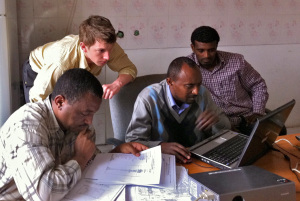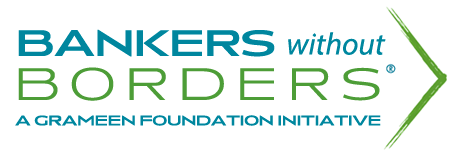David Washer is a Bankers without Borders® volunteer who recently returned from a project in Ethiopia. Upon graduating from Yale University, Washer began his career in portfolio management at McKinsey & Company, where he currently works as a financial analyst. During his time at Yale, he was actively involved in human rights advocacy and research, and now looks forward to using his knowledge of finance and international development in the service of colleagues overseas. I've always had a healthy skepticism about short-term volunteer projects abroad. But as a Texas expatriate living in a Manhattan closet that passes for an apartment, I started to go a little stir-crazy as my heart for social justice from my undergraduate days began to beat again. The irony of it all? As an undergraduate, I had plenty of time – but no true, concrete skills to offer to development organizations. Once I began my work career, the opposite initially held true.
 David Washer (center) spent a week meeting clients and lending his skills in finance to Eshet, an Ethiopian MFI, as part of BwB’s Financial Modeling Reserve Corps.
David Washer (center) spent a week meeting clients and lending his skills in finance to Eshet, an Ethiopian MFI, as part of BwB’s Financial Modeling Reserve Corps.
I began to research and critically examine different service opportunities, and eventually came across Grameen Foundation's Bankers without Borders (BwB) program. Convinced that through this program I could help empower others to lead sustainable, grassroots development in their own communities abroad, I decided to join. I was not disappointed. Once I became a member of the Financial Modeling Blueprint Reserve Corps, BwB provided me with the training, templates and tools I needed to apply my financial analysis and modeling skills in a development context.
(The objective of BwB’s Financial Projections Modeling Blueprint is to help MFIs attract capital by providing their staff with financial education and forecasting tools. The process of creating detailed financial projections helps MFIs to understand the critical success factors involved in designing financial products that both meet client needs and lead to institutional profitability.) Once I completed my training, I was matched with Eshet, a microfinance institution (MFI) in Addis Ababa, Ethiopia. BwB helped facilitate a working relationship with Eshet, so I could offer my professional services at no cost. Over the next month, I conducted interviews with staff there, analyzed its financial statements and began tailoring the model template to fit the needs of the MFI. After roughly one month of desk review conducted remotely from the US, I was ready to travel to Addis Ababa for one week to train Eshet staff on how to use the financial model template, as well as give them general Excel and PowerPoint tips. Currently, Ethiopia is ranked 174 out of 187 countries in the Human Development Index (2011), with approximately 78% of the population, or nearly 80 million, living on less than $2.50 a day (as of 2010). Nevertheless, its microfinance industry is quickly growing and improving. Eshet, for example, now serves approximately 20,000 clients throughout Ethiopia and recently switched from a paper-based to a computer-based system in several of its 12 offices. During my on-site, I had the pleasure of working with three highly professional staff members who were largely responsible for this growth. Together, we built out the BwB financial model using some of the new tips and tricks they had had learned during our training sessions. By the end of the week, the staff was not only able to update the model, but could also manipulate its format, present their findings using PowerPoint and had already generated numerous ideas for how to innovate the model for other business uses. When I left, I felt confident that our work would continue to benefit the MFI and its clients long after my departure. This transfer of knowledge and skills is what makes BwB a uniquely impactful program. Like my client, many MFIs have highly capable staff and the resources available to carry out meaningful work. Once these MFIs have updated their systems or received some foundational training, they are able to hit the ground running and develop their own solutions to the challenges facing their communities. Bankers without Borders meets a critical need of the microfinance sector – capacity building – at a fraction of the cost of a paid consultant. As a proud participant in this innovative volunteer initiative, I look forward to continuing to work with both Eshet and Grameen Foundation.

